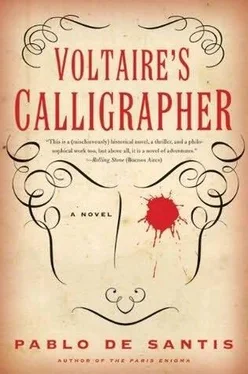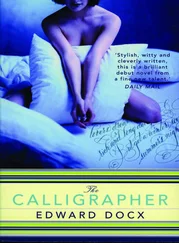A maid opened, said it was late and we should come back the next day. The executioner showed her the silver hand, as if it symbolized some higher authority. Mechanical artifacts held extraordinary power in that house, and the servant let us in, as if we had shown her an order signed by the king himself. We were led into a cold room that had only one chair. Kolm sat down despondently and left me on my feet to nervously pace. After we had been waiting for a while, I wandered into the next room.
Up against the wall was a chest with dozens of wide drawers, similar to the ones at Siccard House. I opened the first with some difficulty and found a variety of mechanisms and gears. Most were made of metal, but some had been carved out of glass. It was obvious that certain pieces fit together like the parts of a sentence, but no matter how long I studied and weighed those pieces in my hands, I couldn’t imagine the grammar that regulated their construction. However, just as an archaeologist may only need to know one word to then decipher an entire dead language, I found something in the third drawer that revealed the whole: sixty-five empty compartments surrounded one glass eye.
There were footsteps and the sound of keys next door. I assumed it must be M. Laghi, the owner, but saw two men come in from outside. I watched them through the half-open door. There was good reason to hide my face because one of them was familiar: the keeper of the keys from Arnim Palace. The maid stared in terror at Signac’s arms and chest. His keys jangled, a sound conveying the authority bestowed by heavy oak doors and thick iron grillwork.
“Monsieur Laghi won’t be long. You can wait for him in the carriage,” the servant said in a quavering voice.
I came out of my hiding place only after they left. Seeing the keeper of the keys had left me shaken. Kolm, on the other hand, sat dozing, completely unaware.
“Let’s leave your walking stick. We can come back for it later,” I said, anxious to leave.
The executioner jolted awake and stared at me blankly for a moment. There was no leaving then, for M. Laghi was walking toward us.
He was dressed entirely in black, as if he were going to a funeral, and in his hand was a small chest. Kolm tried to intercept him, holding up his walking stick, but Laghi barely glanced at it. The executioner, used to asserting his authority, was taken aback by the owner’s disdain. Laghi was in such a hurry, it was as if he already inhabited the future.
“What do you want? Are you with them?” he asked, gesturing to the closed door and, through it, to the abbot’s men waiting for him outside.
“I need you to fix this walking stick.”
The artisan took it dismissively. He tested it two or three times and handed it back to Kolm.
“Take it to a watchmaker. I deal with much more intricate mechanisms.”
“I want you to do it.”
Laghi felt the urge to shove the executioner and call for the men outside to come to his aid, but he hesitated-not out of cowardice but in order not to make the night ahead any more difficult than it already was. He snatched the mechanical hand from Kolm and took it with him. The executioner shuddered at being so abruptly deprived of his walking stick, as if his actual hand had been taken from him.
The house now seemed like a machine that processed people in and out at the will of some hidden design. I was hurrying to escape it when I saw a young woman looking in a mirror, at the end of the hall: she was an exact copy of the woman from Toulouse.
I ignored the maid’s shouts and approached the ghost. She looked at me with wide, staring eyes. Not knowing what sort of sin I might be committing, I kissed the automaton’s icy lips. Her teeth cut my mouth, and I was aware of the metallic taste of blood. Hearing my cry, Kolm came with his fist raised, but he lowered it immediately when he saw it was only a girl.
“There’s nothing to fear. She’s not even real,” I said.
Blood suffused the woman’s cheeks, dispersing the illusion and the pallor.
“Are you sure I’m not a woman?”
She brought her mouth toward me, and I closed my eyes, expecting to be bit again but powerless to defend myself. Her lips rested softly on mine. If she was one of Von Knepper’s creatures, then Von Knepper was a god.
“This is the second time we’ve met,” I said, “but the first time, you weren’t there.”
She gestured for me to be quiet and led me by the hand to a room piled with broken mechanical toys: Dutch dolls with springs protruding from the head or chest, a blackbird in a gold cage, a soldier missing an arm. There was also a steam-powered wooden horse, a palace being circled by the sun and the moon, and a bronze Medusa that would open her eyes and toss her mane of snakes.
“Are you Von Knepper’s daughter?”
“You shouldn’t say his name. Call him Laghi; that’s what he’s known as in Paris.”
I asked about the young woman from Toulouse.
“Is she more beautiful than me? My father made her when I was a child: she was the future image of me. Then she was sold and passed from hand to hand; the purchasers always promised to keep her but never did, as if she were cursed. Three years ago, my father lost track of her. She’s made in my image and likeness, but while I grow old and imperceptibly wear out, she’ll never change.”
“If you two were rivals, you won. There’s nothing left of her. A secret mechanism under her tongue caused her to explode.”
“What kind of tears do you cry for a dead automaton? When my father finds out, he’ll cry real tears. He always loved her better; he thought she was more human.”
“I would never mistake a frigid automaton for a woman.”
“No? You don’t even know who I am.”
She brought her hand to my face, as if she were the one wondering about me.
“Don’t tell anyone you saw her. There are no automatons in France; there never were.”
“That’s what I want to speak to your father about.”
“He won’t see you. My father’s in grave danger. He doesn’t ever let me go out; I’m like a prisoner here.”
“Then I’ve come to set you free.”
If she accepted, what would I do with her? Where would I take her? Thankfully, she declined.
“The world out there is just another jail. At least in here it’s not rainy or cold.”
I looked at the dolls and mechanical toys all around us: everything was broken, nothing worked, and those very defects seemed to be contagious, so that soon we didn’t know what to say or how to move.
I wrote of recent events and my suspicions and asked I my uncle to make sure the letter reached Ferney. My message also asked for money and instructions: I needed to know my words were being heard, that a clear mind was putting the pieces together and arranging my next steps. At the time, it was common for loose pages, found in the bookstores of Paris, to be gathered up and kept in wooden boxes until, at some point, their rightful place was found. It had recently become popular to bind these lost pages, to create a book that jumped from one topic to another. That’s how I felt: I was gathering incomprehensible pages, hoping the great reader, sitting next to a window in a parlor at Ferney, would make sense of them.
Every now and then I would hear rumors that Voltaire was in the city or that he had died, and I would wonder whether I might be working in the service of a lost cause and for no pay.
In the evenings I would watch the Laghi house, hoping to see Clarissa. I was prepared to attempt a second meeting as soon as her father went out. But when I saw Von Knepper hurry away, carrying his little chest, curiosity impelled me to follow him.
Читать дальше
Конец ознакомительного отрывка
Купить книгу












